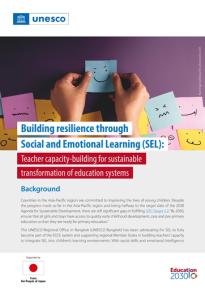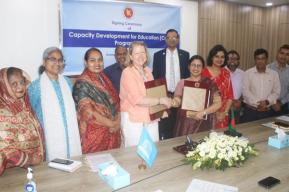Publication
The CapED Programme: Results report 2022

This report provides a comprehensive overview of the results achieved in the calendar year. It also takes a broader perspective, showcasing the potential, initial and enduring positive changes driven by CapED’s sustained interventions.
- 2022 in numbers: a snapshot of key figures and results
- Programmatic focus, highlighting ongoing efforts to improve gender responsiveness within CapED country programmes and how the Programme contributes to poverty reduction.
- Country focus, zoom on selected countries and specific outcomes where UNESCO could identify the earliest observable effects.
- Spotlight on beneficiaries, focusing on frontline stakeholders benefitting from CapED support processes as building blocks for systemic change in education.
The new cycle integrates fresh areas of focus to CapED’s core themes, providing a strong foundation to support and operationalize new global initiatives, including the 2022 Transforming Education Summit and its thematic action tracks to transform education for peace, inclusion, and sustainability.
CapED key results 2022
Country focus
Zoom on selected countries and specific outcomes where UNESCO could identify the earliest observable effects.
- Outcome 1: Benin is formulating and implementing a renewed national TVET strategy to have structures and systems capable of ensuring the development of quality technical and vocational skills that are equitable and accessible to all, and that promote employability, professional mobility and lifelong learning.
- Outcome 2: Benin has a quality, innovative, gender-sensitive training offer, in line with the needs of the labor market in order to meet the specific needs of different population groups, in particular young people from disadvantaged areas
- Outcome 1: Sudan efficiently manages the national TVET system through the implementation of a national TVET strategy, which improves governance, financing and coordination, facilitating the creation of flexible learning pathways and recognition of informal and non-formal learning, with a focus on gender equality, disadvantaged groups as well as digital and green transitions.
- Outcome 2: TVET institutions are able to deliver quality and pertinent programmes responsive to the labour market needs for better employment and entrepreneurship skills with a stronger focus on digital and green transitions involving mainly youth, women and marginalized groups, and form partnerships with private sector actors.
- Outcome 1: Mozambique adopts and implements a sector-wide approach to adult education within a lifelong and gender perspective with the equivalency with primary education in terms of curriculum, teacher training and monitoring and evaluation.
- Outcome 1: Zambia has robust teacher standards, frameworks and policies that provide a clear guidance to attract, develop and retain quality teachers for improved education service delivery through a shared vision of professional teaching competencies and career prospect.
- Outcome 1: Niger develops and implements evidence-based, participatory, inclusive and gender responsive national teacher policies and frameworks and implements quality teacher education programmes that are genderresponsive, inclusive, and efficient to better equip teachers, teacher educators and education officials including STEM, PVE and ICT skills
- Outcome 1: Lao PDR develops and implements robust teacher-related policies and plans towards educational reforms which are evidence-based, gender-responsive, inclusive and participatory.
Spotlight on beneficiaries
Testimonials and first-hand experiences showcas individuals and communities benefiting from the CapED Programme’s interventions.
Uganda: A restructured teacher education system
We don’t have a strong regulatory framework for the teachers. The recommendation was that we needed to establish a National Teacher Council that would now regulate the teaching profession.
Since UNESCO commenced its support in Uganda through CapED in 2013 on the theme of teachers it has observed strong Government commitment to strengthen the sector. Today, the governance of teacher education is being completely restructured, guided by a National Teacher Policy and powered by quality data from an online Teacher Management Information System.
Madagascar : Bridging the gap between vocational training and employment
I love being in constant contact with young people and being able to help them define their personal and professional projects so that they can find their way and succeed in life.
Integration and Guidance Counsellors are key to increasing the integration of new workers into the job market and thereby reduce national unemployment. Their role is to act as a bridge between learners, TVET centres and the world of work. They act as career advisors, supporting learners transition into the job market or entrepreneurship, while building long-term relationships with the private sector to help learners find internships and employment opportunities. With support from CapED, Madagascar’s Ministry of Technical Education and Vocational Training (METFP) is working towards setting up committees in every TVET institution to be run by CIOs.
Senegal: Youth benefit from vocational training in national languages
I have no problem following the lessons because they are taught in a language that I better understand, this allows me to understand what is being taught.
Senegal is characterized by its rich linguistic diversity. While French is the official language, there are many other recognized national languages. Figures show that only some 1% of grade 2 students in Senegal are taught in the language they speak at home. Although this rises to some 5% by grade 6, the figure remains low. UIS data shows that children who do not speak the language of instruction at home are more likely to leave school early. These challenges are also present in adult education. The increase in the number of non-literate and out-of-school youth is in part due to a deficit in literacy provision and Senegal's school enrollment rate, which despite rising to 85.9% in 2020, is still below the national target of 90.8%. In this context, UNESCO,
through CapED, has supported the Government to launch a pilot to offer non-literate or out-of-school youth vocational training.














